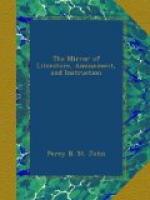The English costume was remarkably neat and plain anterior to the year 1748; at which period, however, all gentlemen rather resembled military officers than private individuals, for their coats were not only richly embroidered with gold and silver, but they even assumed the cockade in their hats, and carried long rapiers at their sides. At length this imposing attire was adopted by the merchants and tradesmen of the metropolis, and soon afterwards by the most notorious rogues and pickpockets in town, so that when any person with a laced coat, a cockade, and a sword, walked along the streets of London, it was absolutely impossible to determine whether he affected to be thought a nobleman, a military officer, a tradesman, or a pickpocket, for he bore an equal resemblance to each of these characters.
In the year 1749, hair-powder was used by the finished gentlemen, though the use of it, a year or two previous, was prohibited in every class of society. Of the costume of this period (i.e. about 1749), the immortal Hogarth, in his works, has left us numerous specimens, which need no comment here: his productions, indeed, are so equal in merit, that it is impossible to decide which is his ne plus ultra.
In conclusion, I would advise the reader to refer to a few of Hogarth’s prints, for they will admirably serve to illustrate the above observations on the fashions and habits of our forefathers.
* * * * *
Astronomical Occurrences
FOR NOVEMBER, 1827.
(For the Mirror.)
Should the afternoon of Saturday, the 3rd of the month, prove favourable, we shall be afforded an opportunity of witnessing another of those interesting phenomena—eclipses, at least the latter part of one, a portion of it only being visible to the inhabitants of this island; the defect above alluded to is a lunar one. The passage of the moon through the earth’s shadow commences at 3 h. 29 m. 34 s. afternoon; she rises at Greenwich at 4 h. 45 m. 34 s. with the northern part of her disk darkened to the extent of nearly 10 digits. The greatest obscuration will take place at 5 h. 7 m. 42 s. when 10-1/2 digits will be eclipsed; she then recedes from the earth’s shadow, when the sun’s light will first be perceived extending itself on her lower limb towards the east; it will gradually increase till she entirely emerges from her veil of darkness, the extreme verge of which leaves her at her upper limb 32 deg. from her vertex, or highest point of her disc.
We have the following in “Moore,” some years ago, on the nature and causes of eclipses of the sun and moon:—
“Far different sun’s and moon’s
eclipses are,
The moon’s are often, but the sun’s
more rare
The moon’s do much deface her beauty
bright;
Sol’s do not his, but hide from
us his sight:
It is the earth the moon’s defect
procures,




